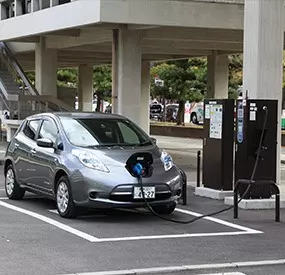Are Electric Cars Environmentally Friendly?
The Institute for Energy and Environmental Research in Heidelberg concluded in a 2011 study that the overall carbon footprint of battery-powered vehicle resembles that of a conventional car with a combustion engine. The cars produce fewer emissions while being driven but the powerplants emit CO2 when charging electric vehicles. However, this is calculated under present conditions. It assumes that the electricity is produced using non-renewable technology. For countries that produce a lot of electricity from solar or wind sources, these cars offer a better choice for the environment.
Over half of Germany's electricity comes from coal and gas. Charging an electric car out of a German power socket would mean a person will have to drive 100,000 kilometres to produce less CO2 emissions than driving a petrol or diesel engine car.
Electric cars do not produce nitrogen oxide which is harmful to our health, neither do they emit greenhouse gases that damage our climate. They are quiet, easy to operate and also have some advantages over petrol and diesel vehicles.

Energy-intensive Battery Production
The most significant environmental problem is currently from the manufacture of electric vehicles. Fraunhofer Institute for Building Physics revealed in its study that producing an electric car takes twice as much as energy as manufacturing a conventional car.
The battery is the reason behind the difference with the Institute explaining that with each kilowatt-hour of battery capacity, there are 125 kilograms of CO2 emissions. In effect, a BMW i3 with 22-kilowatt-hour battery capacity, it will produce 3 tons of CO2 emissions.

Further, the IVL Swedish Environmental Research Institute concluded the battery production to be 150-200 kilograms of CO2 per kWh. The study also states that with the current technology of battery production, for every kWh, it needs 350 to 650 Megajoule of energy.
Besides, making batteries needs minerals such as copper, cobalt and rare earth for example neodymium. Countries like the Democratic Republic of Congo and China violate human rights with their mining activities while causing massive ecological damage through deforestation, river pollution, and soil contamination.
Further, many electric cars have their bodies made from aluminium, yet processing bauxite ore into aluminium requires a lot of energy.
Do Electric Cars Produce Less Carbon Emissions?
Electric cars using electricity obtained from renewable sources produce up to 6 times less CO2 emissions in their lifespan compared to a petrol car. As a result, for countries to switch to EVs efficiently, they will have to change their energy generation as well.
In 2016, Germany had 34% of its energy coming from renewable sources, and it wants to increase this amount to 55-60% by sourcing its electricity from wind, biomass and solar. Scientists in several universities are coming up with ways on how to reuse and recycle electric car batteries such as using them for industrial processes. If a battery can still be useful after the life of a vehicle, then the impact it will have on the environment will go down. Research is also ongoing on how the batteries can be more effective even while in the vehicle. Engineers are interested also in learning how the electric cars can serve as storage devices in the overall energy grid.
By plugging a car overnight, it can instead feed the energy grid when there is a lower generation of renewable energy. Despite the agreement that electric vehicles are not zero-emission cars, they still are beneficial to the environment and the climate as a whole in comparison to conventional vehicles running on petrol or diesel.
Read more about buying an electric car in the UK.
Are you looking for used electric cars in Inverness, Aberdeen, Dundee, Glasgow, Edinburgh? We are electric car specialists working with customers throughout the UK. If you want to find out more about our second hand electric car deals, follow the link below.
